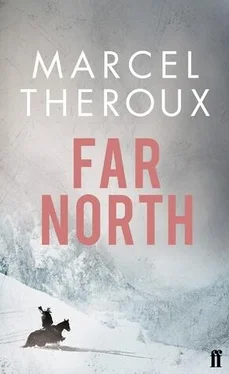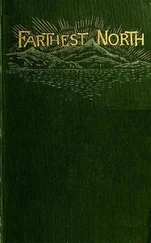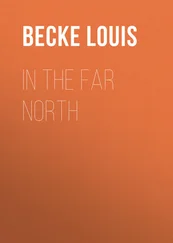Short of any other ideas, the Church sent my father and another man on a mission to visit. They flew to Moscow and travelled out by train to Irkutsk.
Nothing I’ve known in the Far North resembles the land of ice that people expected him to find here.
The farthest north I went in my life was with my father when I was fifteen up to the Chukchi people in tundra country. He took me instead of Charlo not just because I was older, but because he was expecting a difficult journey. I know that he valued my hard and practical nature, seeing that the rest of them were all talkers and thinkers. That’s some comfort to me now, since I wished for so many years that I could be more scholarly and soft, a daughter he could be proud of.
Even where the Chukchi lived it was nothing like a frosty desert.
It was summer and the land was purple and brown. There was tiny arctic willow and rhododendron growing in the boggy ground. They bred dogs for fur and travel. The water heaved with salmon and they had crabs you could eat with legs a foot long. I saw seals, and ate walrus, and watched whales breach the cold green water of the bay and spout. There was nothing barren or poor about that land. And that was up at the lip of the arctic circle.
My father would say later that by the time he stepped off the train, he had fallen in love with the land. Day after day, birches and pines swished past the window, and little wooden villages, and churches with gilded onion domes. He said he felt as though he’d come back to a place he had seen in a dream. It looked like the storybooks of his childhood.
I have a sense of what he meant, but I’ve never known another landscape. I grew up with bears in the woods behind our house, and wolves, and poisoned toadstools, and a rotten bridge that might well have had a troll under it, so the storybooks never seemed that far-fetched to me. What seems far-fetched is life in a city, or my father’s tales of Chicago, or the plane which I saw with my own eyes breaking up on that hillside.
*
The land was leased to us by the Russian government to build and farm on. Why had they let us in? Simple. Their leaders wanted us to fill up the empty spaces of their country. We were a graft from a strong and youthful plant. The people here were sick and depleted, and the Chinese across the border were looking on Russia’s empty regions with a hungry eye.
By leasing small tracts of the Far North to us, the Russians got to restock the land with European settlers. The settlers got more land than they knew what to do with. And it seemed like a smart bet to us. Our summers in the north were getting longer and our winters milder. No one was overly concerned that what was easing the cold of our winters was making the crowded parts of the globe hot and hungry and restless.
I was born in the false dawn of those early years. The dawn that was really a sunset.
But in those peaceful times, four or five cities followed ours, drawing their citizens from people like my father, who’d never fired a shot in anger, or known a hungry day.
To them, the cold and hardship of their new world felt bracing and good, like rolling in snow after a steam bath. This life was a novelty to them and something freely chosen.
‘Aren’t you glad,’ they’d say, ‘that you live here in this beautiful place, and don’t travel miles by bus to eat plastic food in a school cafeteria?’ I’d answer yes, but only to please them. They painted a picture to us of the world they’d left: rootless, money-crazed people, enfeebled by soft living, trapped in violent cities of night and rain.
Not knowing the world they left, I can’t say if it was like that or not. But I don’t share their view of the merits of scarcity. We come out of the dark, as frail and tender as the furry buds on an antler. Why turn your back on anything that will make life easier? Why spurn cities and machines, diesel, plastic, medicine?
It was a matter of faith with them. I suppose all settlers must be zealots first. Those first colonists who went to Roanoke or Plymouth, what did they think as night fell for the first time over their strange anchorage? Behind them were playhouses and libraries, stone churches, the wellkept graves of their ancestors. In front of them were the forests of their weird Canaan, birds and plants they couldn’t recognize, and the unwelcoming spears of their new neighbours. How did they know the land could even support life?
*
We had had to renounce our old countries as a condition of settling here.
At the time, this land was almost as empty as it is now. Even so, the settlers had to pay twice over for it: they handed over cash for the title to the land, and they gave up the rights they had as citizens of other nations. What’s more, they had no right to what lay under it — oil, diamonds, or gas. The government kept that for itself. We owned nothing below the thin topsoil.
My father kept his old navy-blue passport along with his birth and marriage certificate up in a tin box in the attic, but it was a worthless document, and all those like me who were born here were born stateless.
It was a high price, and many baulked at paying it. Some had pointed to the empty spaces of Canada and said we should settle there instead. But the land in Canada that suited them belonged to its native people, while on the other side of the straits the Tungus had no such claim.
It never seemed to matter too much at first. The most religious among us regarded nationhood as a fiction. But by coming here, we made ourselves into orphans.
The Russian government never looked upon us as real citizens. Eventually, they would grow to hate us, but first there were many years of official indifference. Once or twice, they sent bigwigs to see that all was in order, but soon those visits stopped. No one paid us much heed, tucked up in the empty north of this huge country. We were left to ourselvesht=p>
Seventy thousand people had come, all up, in three waves of settlement that lasted over ten years. Most of them were Quakers like my father and mother who had turned late to their faith. Others were believers of a different strain who held that we stood in the last days and the chosen would shortly be snatched up to heaven in the Rapture. A few had no fixed faith at all, but worshipped nature, or reason, or just believed that the old crowded cities they had grown up in were hopelessly out of whack with how life ought to be. The chief thing they had in common was the shared belief that the old world was going to hell in a handbasket. None was fleeing poverty; if anything, they were fleeing its opposites: money, greed, idolaters. Some left the old lives happily, and some left with a great sadness, feeling it was a defeat and an abandonment. But all of them believed that in the space and stillness of the Far North, they would recover the quiet music of life as it ought to be, austere, rugged, shaped by the seasons and the knowledge of hardship, and contact with others like them.
The settlers were hard-working folk. The cities thrived. The winters grew milder. There were hot springs to the north of our city which we piped to heat our glasshouses. We raised tomatoes in the arctic and talked about growing oranges.
Gradually, over time, it became clear that the settlers had less in common than they imagined. The absence from the world made their differences bigger. And try as you might to begin afresh, pretty soon people fall into old ways of doing things. A lot of life is habits. Start everyone off equal, some still wind up with more and want to protect it, some wind up with less and cry foul.
But I think in those first years, there was a sense of promise about the place, and a sense of mission and hopefulness around what the people were doing.
When war broke out, the government demanded oaths of loyalty from us. The many Quakers among us were barred by their faith from swearing to anything. The best they could do was an affirmation — but the government took it ill. And when we told them our young men wouldn’t serve in their army either, they withdrew the little they’d granted us: cheap fuel, medicines, the teachers who had travelled here to school us in our new mother tongue. But we’d come here to be left alone. There was nothing they had that we wanted. If anything, it bound us together a little more.
Читать дальше












